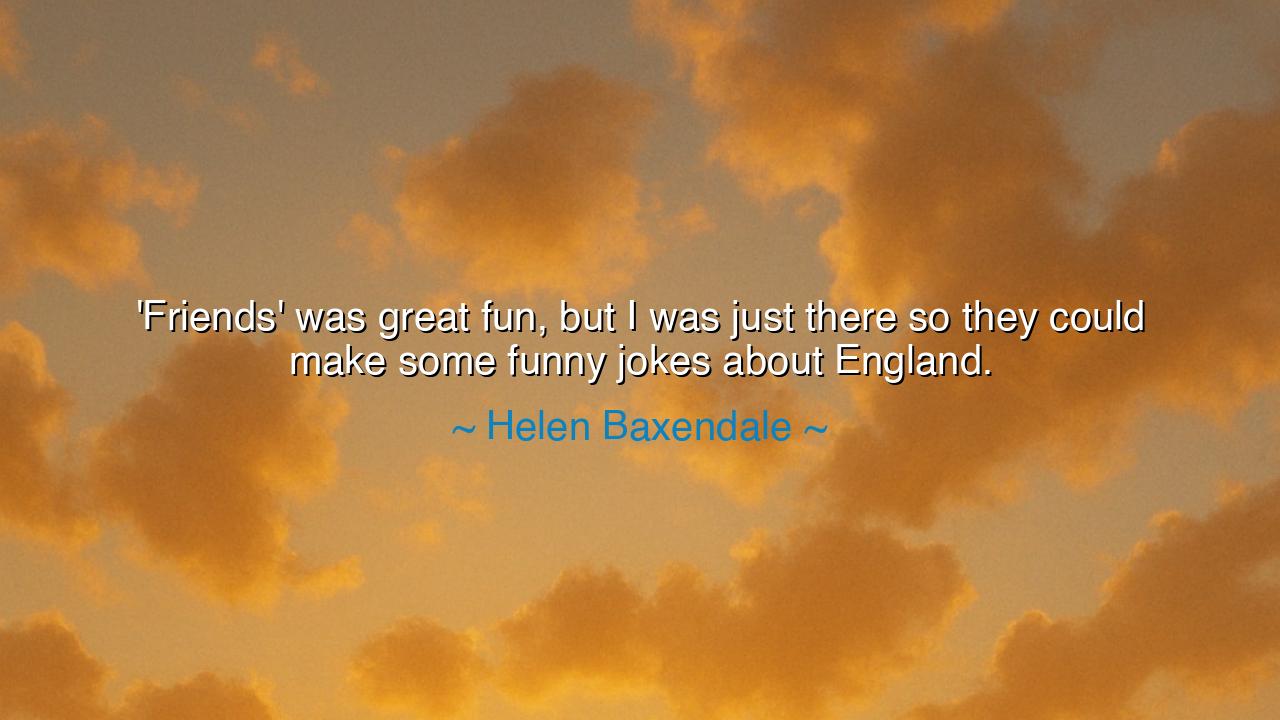
'Friends' was great fun, but I was just there so they could make
'Friends' was great fun, but I was just there so they could make some funny jokes about England.






Hear, O seekers of understanding, the words of Helen Baxendale, the actress whose grace and honesty reveal the quieter truths of fame and creation. She once said: “‘Friends’ was great fun, but I was just there so they could make some funny jokes about England.” In this simple, candid confession lies a truth that stretches across the ages—the tension between being seen and being used, between participation and belonging, between the joy of the moment and the ache of knowing one’s place within it. Though she spoke of a television comedy, her words carry the weight of all who have ever stood in a story not entirely their own.
For in her words is the reflection of the outsider, the one whose presence serves another’s tale. Helen Baxendale, known for her sharp wit and poise, entered the world of Friends—a realm of laughter, adored by millions—but found herself there as the Englishwoman in an American dream, the figure through whom the writers could make their jokes about tea, manners, and accents. It was not cruelty, but it was distance. She was seen, and yet not fully known. This, she says with quiet dignity, is what it means to be part of something joyous yet not central—to bring value without being valued equally. Such is the bittersweet truth of many artists and souls who lend their light to another’s sun.
The ancients, too, knew this feeling well. Consider the tale of Laocoön, the priest of Troy, who warned his people against the wooden horse. His words were true, but the people’s story was not his to command. His truth was swallowed by the greater narrative written by fate. Or think of Hypatia of Alexandria, whose brilliance shone in an age that celebrated knowledge yet could not bear it from her lips. Like Helen, they stood in the great stage of human history, their presence essential yet their voices muted by circumstance. To exist within a grand tale but not as its author—this is both the blessing and the burden of those who walk in the shadow of collective glory.
Yet, there is no bitterness in Baxendale’s tone. Her words carry not resentment, but clarity. She calls the experience “great fun,” recognizing that even within the confines of her role, there was joy, creativity, and camaraderie. But she also names the truth—that sometimes joy does not equal fulfillment. To laugh among others while knowing you are not fully seen is a subtle kind of melancholy, one that only those of self-awareness can express without anger. Her honesty is the wisdom of the artist who loves her craft, yet refuses to be blind to its illusions.
Her reflection also speaks to a greater human condition. In life, many of us play roles that serve the stories of others—the worker in the company that profits from their toil, the friend who listens but is not heard, the citizen who gives voice yet is ignored. Like Helen, we may find ourselves part of something grand, yet defined by the expectations of those who wrote the script. But here lies the moment of awakening: to see clearly one’s position is the first step toward reclaiming one’s agency. Awareness is liberation, and from awareness comes the power to choose whether to remain, to reshape, or to walk away.
Consider the story of Joseph in Egypt, sold into slavery by his brothers, made a servant in the house of another. For years, he lived in the story of others—of masters, of prisons, of kings. Yet through his faith and clarity, he rose to power, becoming the author of his own destiny. So too can the one who feels used within another’s tale eventually find their own narrative. Helen Baxendale did not dwell in Friends forever; she continued her craft elsewhere, building roles and stories that reflected her truth. Thus her quote, though tinged with humor, is also an act of reclamation—a reminder that the artist’s worth is not measured by how central she is to a single story, but by the authenticity of her journey.
Therefore, take this lesson into your heart: do not confuse participation with purpose, nor visibility with value. You may stand in another’s story for a time, and that is no shame. But never forget that you, too, are the author of your own. Whether in work, love, or art, seek not merely to be included, but to be true. And if ever you find yourself reduced to a symbol—a token, a stereotype, a convenient part of someone else’s joke—remember Helen’s calm wisdom: name it, smile at it, and move forward toward the story that is yours to tell.
For in the end, as the ancients taught, every soul must speak its own truth into the world. And those who do, as Helen Baxendale did, leave behind not the echo of laughter written by others, but the enduring sound of authenticity—the voice that says, with quiet strength, “I was there, and I saw clearly who I was.”






AAdministratorAdministrator
Welcome, honored guests. Please leave a comment, we will respond soon